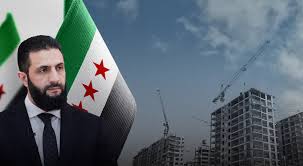The United States has confirmed that the process of lifting sanctions on Syria is now underway, signaling a potential breakthrough in Damascus’s efforts to reenter the regional and international system after years of isolation. The announcement comes on the heels of a landmark meeting between U.S. President Donald Trump and Syrian transitional president Ahmad al-Sharaa in Riyadh last week—a move widely seen as a cornerstone in Washington’s evolving Middle East strategy.
Speaking to Syria’s state news channel, U.S. State Department regional spokesperson Michael Mitchell stated that the Trump administration is in the final stages of issuing executive orders to formalize the sanctions relief, pending completion of key legal procedures.
“Syria is an important country in the region,” Mitchell said, adding that it is both “logical and necessary” to open a broader dialogue with regional partners to support Syria in this transitional phase. He further emphasized that Washington came away with “a positive impression” of the Syrian leadership following the Trump–Sharaa meeting, which also involved Saudi Crown Prince Mohammed bin Salman and Turkish President Recep Tayyip Erdoğan via video link.
President Trump had first declared the sanctions relief during his keynote address at the Saudi–American Investment Forum last Tuesday, where he cited Syria’s long years of war and suffering. “The time has come to give Syria a new chance,” he said, describing the measure as the first step toward normalizing U.S.–Syrian relations and expressing hope that Damascus would be able to stabilize and rebuild.
The decision received a warm welcome from the Syrian government and several Arab states, many of which hailed it as a pragmatic move toward regional de-escalation and reintegration. Trump clarified that his decision was made after consultations with key allies, including the Saudi Crown Prince and President Erdoğan, as well as other regional leaders.
Syria at the WHO: First Official Appearance Since Sanctions Relief
In a symbolic development reinforcing Syria’s renewed international engagement, the country is officially participating in the 78th session of the World Health Assembly, which began Monday in Geneva. Syria’s Minister of Health, Dr. Musab al-Ali, joined delegates from WHO member states under the summit’s banner: “One World for Health.”
The assembly—one of the largest in the organization’s history—comes amid unprecedented financial and structural challenges for the World Health Organization. The event is focused on building resilient health systems, bolstering emergency responses, and enhancing epidemic preparedness, especially for low- and middle-income countries.
The WHO faces a projected funding gap of over $1.7 billion for the 2026–2027 period. To address this, the organization announced several austerity measures, including a 25% reduction in staffing across certain offices, halving the number of executive directors, and plans to consolidate or relocate facilities to cut operational costs.
Despite the budgetary pressures, WHO officials underscored the importance of maintaining core health services in conflict-affected and fragile countries like Syria. The assembly is also reviewing proposals to reform global health governance and secure more predictable financing mechanisms in the wake of recent global health crises.
Syria’s return to global platforms—political and technical alike—reflects an early but significant test of its ability to capitalize on shifting geopolitical currents. As Washington cautiously opens the door to re-engagement, Damascus appears eager to signal its readiness to participate constructively on international stages once more. Whether this moment evolves into sustained integration or remains symbolic will depend on the next set of decisions—both at home and abroad.
This article was translated and edited by The Syrian Observer. The Syrian Observer has not verified the content of this story. Responsibility for the information and views set out in this article lies entirely with the author.


